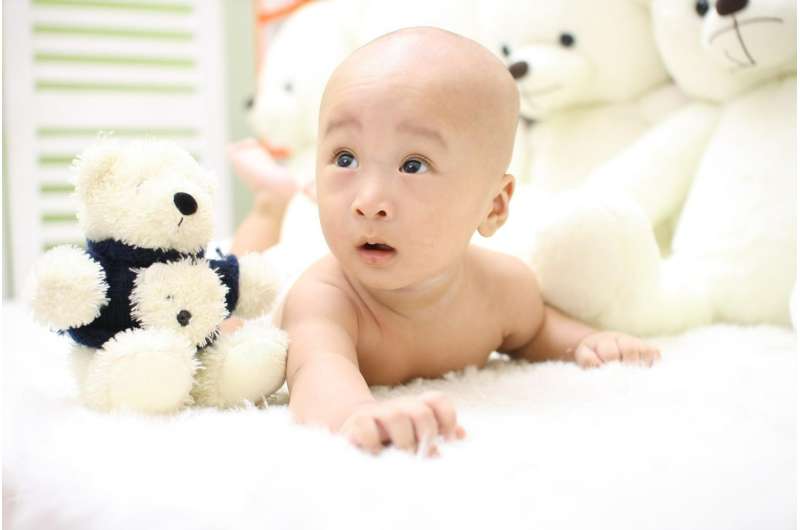June 27, 2017 report
Study finds babies younger than six months old able to acquire phonological knowledge

(Medical Xpress)—A trio of researchers with the Max Planck Institute of Psycholinguistics has found that babies are able to acquire phonological knowledge in the first months after birth. In their paper published in Proceedings of the National Academy of Sciences, Jiyoun Choi, Mirjam Broersma and Anne Cutler describe their study involving testing adult Koreans who had been adopted as babies into the Netherlands and what they found as a result.
The unproven consensus among scientists has been that human phonological development (the ability to discern differences in sounds) does not occur until after the age of six months. In this new effort, the researchers overturn that assumption by showing that not only do babies acquire such knowledge at an earlier age than thought, they retain it for perhaps the rest of their lives.
The study by the researchers consisted of testing three groups of volunteers who all currently live in the Netherlands. The first group consisted of adults who had been adopted from Korea after 17 months of age, the second group consisted of adults who had been adopted from Korea prior to 6 months, and the third was a group of native adults who had not been adopted. Each group listened to phonological sounds that were unique to the Korean language to see if they could distinguish between them. Afterwards, each group was trained to hear the differences in the sounds and each volunteer was tested to see how well they picked them up.
The researchers report that all three groups were unable to distinguish between the sounds in the first tests. The second tests went very differently, however—both of the adoptee groups learned how to distinguish the sounds faster than the control group. This, the researchers claim, suggests that all of the adopted volunteers had acquired some degree of phonological knowledge during their short time in Korea, which, of course, included those who had done so before reaching six months of age. They also suggest their findings are likely to unleash a new wave of projects designed to better understand what sorts of things are learned by babies at specific ages.
More information: Jiyoun Choi et al. Early phonology revealed by international adoptees' birth language retention, Proceedings of the National Academy of Sciences (2017). DOI: 10.1073/pnas.1706405114
Abstract
Until at least 6 mo of age, infants show good discrimination for familiar phonetic contrasts (i.e., those heard in the environmental language) and contrasts that are unfamiliar. Adult-like discrimination (significantly worse for nonnative than for native contrasts) appears only later, by 9–10 mo. This has been interpreted as indicating that infants have no knowledge of phonology until vocabulary development begins, after 6 mo of age. Recently, however, word recognition has been observed before age 6 mo, apparently decoupling the vocabulary and phonology acquisition processes. Here we show that phonological acquisition is also in progress before 6 mo of age. The evidence comes from retention of birth-language knowledge in international adoptees. In the largest ever such study, we recruited 29 adult Dutch speakers who had been adopted from Korea when young and had no conscious knowledge of Korean language at all. Half were adopted at age 3–5 mo (before native-specific discrimination develops) and half at 17 mo or older (after word learning has begun). In a short intensive training program, we observe that adoptees (compared with 29 matched controls) more rapidly learn tripartite Korean consonant distinctions without counterparts in their later-acquired Dutch, suggesting that the adoptees retained phonological knowledge about the Korean distinction. The advantage is equivalent for the younger-adopted and the older-adopted groups, and both groups not only acquire the tripartite distinction for the trained consonants but also generalize it to untrained consonants. Although infants younger than 6 mo can still discriminate unfamiliar phonetic distinctions, this finding indicates that native-language phonological knowledge is nonetheless being acquired at that age.
© 2017 Medical Xpress




















